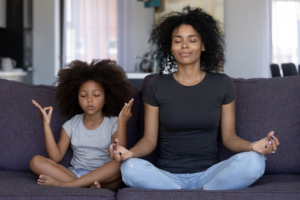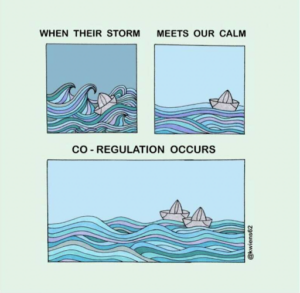
Has your cheerful child ever quickly become a ball of tears when a near-by peer begins crying? Have you ever lost the pep in your step after spending time around a grumpy co-worker? This is because the feelings and behaviors of people in close proximity to us, directly impact how we feel, and respond to our own emotions. In the same way adults are impacted by others actions, children pick up the moods of others around them. However, being able to regulate emotions effectively and efficiently is not an innate skill. A child’s capacity to manage their big emotions relies on their brain development and their experiences. Therefore, when feeling upset or overwhelmed children look to their caregivers for help with regulating their emotions and appropriately respond to external stressors.
What is Co-Regulation?
Co-regulation is the supportive process between caring adults and children that fosters self-regulation development. The process of co-regulation actually elicits changes in the brain. Neuroscience shows that as you co-regulate with someone the mirror neurons in the brain are activated which enables the person in a dysregulated state to “mirror” your calmness. Children are constantly watching us for cues on how to feel and react, and they need the adults in their lives to join them in their efforts to regulate their brain, body, and emotions to meet the demands of the situation they are in. Therefore, before young children can self-regulate, they first need the support of the adults around them to teach and help them develop the abilities to regulate on their own.
Why is it Important?
Co-regulation is the foundation to children learning how to self-regulate. In order to move from a co-existing place to a place of independence, a child needs to first develop emotional intelligence and social emotional learning. Caregiver co-regulation allows caring adults (parents, teachers, etc.) to facilitate children’s emotional regulation by providing them with external support. These experiences serve as scaffolds for children to develop their own ability to deal with strong emotions and external stressors.
How to Support Co-regulation?
The best way to help your child develop their self-regulation skills, is to support them in co-regulation, by modeling and teaching them calming strategies and tools they can learn to use on their own. When adults stay calm, children can become calm and feel secure. When children become or stay calm, they are better able to listen, learn, and engage. 
Strategies for Supporting Co-regulation:
- Create a warm & positive relationship with your child
- Provide physical and emotional comfort when your child is distressed or dysregulated
- Recognize and respond to your cues your child is giving that signal their wants and needs
- Show interest in your child’s world
- Structure the environment
- create an environment that is physically and emotionally safe for your child to explore and learn (this may include incorporating sensory supports if needed)
- Provide consistent routines
- Clearly communicate expectations
- Model and teach self-regulation strategies such as:
- Labeling emotions – you can help your child learn to process big feelings by helping them label what they are feeling, and work together to solve their problem.
- Coach your child on using self-calming techniques like taking deep breaths or a break, positive self-talk, or using a sensory support
- Provide a calm-down space for taking a break when your child is overwhelmed
If your child is demonstrating difficulty maintaining a regulated state, consider contacting one of our occupational therapists or social workers, who can provide your family with helpful tips and tricks to support your child’s self-regulation skills.
Questions or concerns?
If you have questions or concerns about your child’s responses to noise, please contact us at info@playworkschicago.com or 773-332-9439.
Rachel Sitzmann, MS, OTR/L
Occupational therapist
References:
Bath, H.I. (2008). Calming together: The pathway to self-control. Reclaiming Children and Youth, 16, 4. pp. 44-46.
Rosanbalm, K.D., & Murray, D.W. (2017). Caregiver Co-regulation Across Development: A Practice Brief. OPRE Brief #2017-80. Washington, DC: Office of Planning, Research, and Evaluation, Administration for Children and Families, US. Department of Health and Human Services.
Photo Credit: parentingnow.org (1): Kristen Weins (2) via exceptionallives.org
